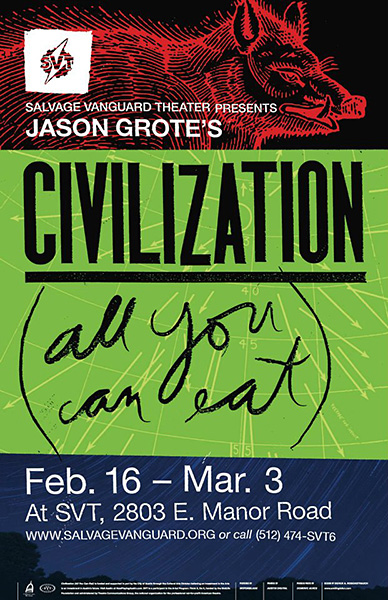Civilization (All You Can Eat)
Introduction & Table of Contents
 |
|
| Civilization (All You Can Eat) Salvage Vanguard Theatre |
|
|
Playwright’s Notes |
|
Jason Grote’s Civilization (All You Can Eat) is a poignant commentary on America’s political landscape, not only at a national level but also within every home, at every dinner table, in every workplace. Set in the summer before the 2008 election, Grote captures the intense economic insecurity and extreme political divisiveness of the time through various characters like Carol and Jade, a mother and daughter who bicker over unpaid bills and an abusive boyfriend, or Zoe and Mike, a couple vying for fame and recognition despite already achieving the “American dream.”
The disruption that occurs throughout the play—ranging from the filming of Twix commercials (Zoe’s controversial work project) to the musical interludes with their interpretive “erotic and utopian” movement—mimics the disjointed family that Grote has captured as a microcosm of a much larger national disconnect. The characters are not only interrupted structurally within the play but also by each other, a commentary on the one-sided dialogue that is increasingly pervasive in much of our media today.
At its core, Civilization is deeply satirical and critiques the privilege of “political correctness” while advocating for education and connection. Behind all of the dinner table banter and the piling-up of bills looms Big Hog, the omnipresent “mascot . . . [of] our all-devouring future [and] our blinkered past.” Big Hog’s embodiment of American capitalism and consumerism never wanes throughout the play, forcing audiences to stay on their toes even in moments where there is an expectation of tenderness, like when Big Hog and Jade, a self-proclaimed vegan, meet alongside a highway. If there is one thing Grote reinforces, it is that “there is a mistake you can make. And that is that Big Hog is something to be underestimated.”
Civilization (All You Can Eat) has been performed in four cities in the US: New York at Clubbed Thumb’s Summerworks, directed by Seth Bockey; Washington, D.C. at Woolly Mammoth, directed by Howard Shalwitz; Austin at Salvage Vanguard Theater, directed by Jenny Larson; and Los Angeles at Son of Semele Ensemble, directed by Don Boughton. Blackbird presents the play in its entirety with an accompanying statement from the playwright and the two directors of the original production, along with several photos. ![]()